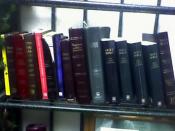In the following Discussion, I will point out the facts and ideas that disagree with Hume's ideas. The ideas are the ones on miracles in An Enquiry Concerning Human Understanding involving Section ten Of Miracles. The idea of this is using the circle philosophical argument. If one agrees that Christians believe in the Bible, and that miracles have people understand the Bible as Hume points out, then Christians must believe in miracles. If one takes away any of these things, the statement does not hold. In this case, the removal of the Bible is used.
Hume confronts the ideas of religion directly by stating that without the splendor of miracles, Christianity and other beliefs would not stand. He states that miracles are used to make us believe the scriptures. This is not true, since from the starts of Christianity there were not always scriptures. There were pieces of art work done for generations before the texts were written and after that, they still had to be published.
From there, only the rich were well off enough to afford such a book. In fact, the Gospels were written from 20-100 years after Christ died. The Acts were a collection of works made from two hundred to three hundred years after the crucifixion, collected from different accounts. And then there are the letters, which were written approximately four hundred and fifty years after the fact. They were written by St. Paul, who was also a soldier for the Roman army and killed hundreds of Christians, who believed and followed God, without the scriptures that Hume talks about. From this, if you take away the scriptures, God's church carries on and if you take the people from the church, 'God's church' still survives. The scriptures do not make people believe, they help people...


